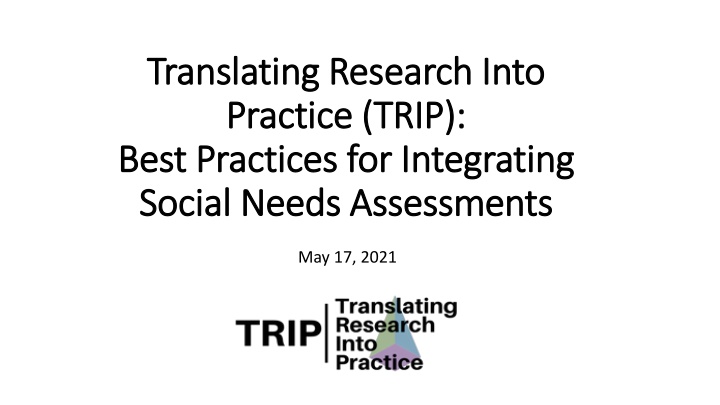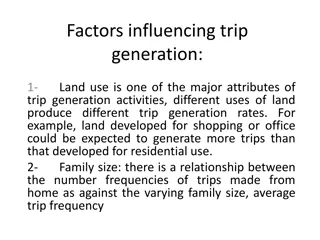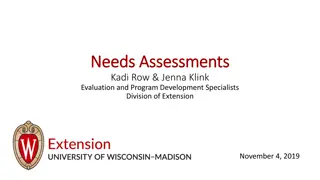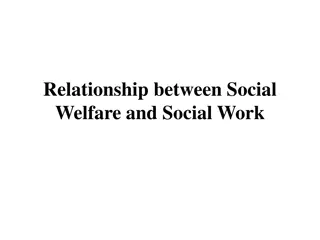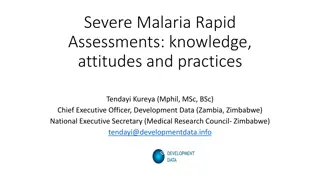Best Practices for Integrating Social Needs Assessments in TRIP Research
TRIP focuses on implementing evidence-based patient navigation to reduce delays in treatment and disparities among vulnerable women in Boston by utilizing social needs assessments, real-time patient registry, and navigation services. The intervention components include systematic social needs assessment, real-time patient registry, and patient navigation services, with a focus on addressing disparities through coordinated care across multiple sites. Adopting best practices such as baseline workflow assessment, training, super user involvement, and empathetic inquiry skills practice enhances the integration of social needs assessments and improves patient outcomes.
Download Presentation

Please find below an Image/Link to download the presentation.
The content on the website is provided AS IS for your information and personal use only. It may not be sold, licensed, or shared on other websites without obtaining consent from the author.If you encounter any issues during the download, it is possible that the publisher has removed the file from their server.
You are allowed to download the files provided on this website for personal or commercial use, subject to the condition that they are used lawfully. All files are the property of their respective owners.
The content on the website is provided AS IS for your information and personal use only. It may not be sold, licensed, or shared on other websites without obtaining consent from the author.
E N D
Presentation Transcript
Translating Research Into Translating Research Into Practice (TRIP): Practice (TRIP): Best Practices for Integrating Best Practices for Integrating Social Needs Assessments Social Needs Assessments May 17, 2021
TRIP*: Addressing disparities together TRIP*: Addressing disparities together Tracy Battaglia, MD MPH Karen Freund, MD MPH Jennifer Haas, MD MPH Stephenie Lemon, PhD Boston Patient Navigator Network Clinical Advisory Panel Boston Patient Navigator Network Funded by: 2 *NIH/NCATS U01TR002070
TRIP: The Research Question TRIP: The Research Question Can we systematically implement evidence-based patient navigation across the city of Boston to reduce Can we systematically implement evidence-based coordination of care across the city of Boston to reduce delays for the most vulnerable women? delays in treatment and reduce disparities? 3
TRIP Intervention Components TRIP Intervention Components Systematic Social Needs Assessment (Aunt Bertha) Real-time Patient Registry Patient Navigation Services 4
Pre Pre- -TRIP Workflows Across 6 Sites TRIP Workflows Across 6 Sites
Best Practices for Integrating Best Practices for Integrating Social Needs Assessments Assessments Baseline workflow assessment at each site 1-hr meeting Provided trainings and support to increase adoption Schedule: 2 hour training at startup, 3 1-hr check-ins over first 9 months Brought in a super user Skills practice (Empathetic Inquiry) Monitoring and data feedback Monthly review of platform usage data Adapted Aunt Bertha functions to each site Social Needs 6
Navigator Feedback Navigator Feedback Facilitator: Language capability That's one really wonderful resource for us...now, we can just find out the social resource and provide a patient directly. But on the other hand, it's not really helpful for the patient who not speak English, because all the information provide to the patient is English, right? Barrier: Double data entry I think the only challenging part is remembering to use Aunt Bertha or to document things. Because it is kind of difficult to think, when I'm already documenting in the EMR or Epic, I fill out a flow sheet, I write out all these different things. Barrier: Concern about patient acceptability My feeling is sometimes patients, I mean this is just my own bias, I think that they are embarrassed sometimes that we're asking them these questions and here I am, I speak English and I'm working and they probably realize that or they think that I have health insurance and everything else. 7
Continued Challenges with Adoption Continued Challenges with Adoption Patients eligible only for Aunt Bertha SNAs (n=172) Platform Response Completed Initial SNA 100 (58%) Aunt Bertha Completed Follow Up SNA 21 (12%) Patients eligible for THRIVE SNAs (n=167) 164 (98%) Completed Initial SNA THRIVE Completed Follow Up SNA 32 (19%)* Data from 9/1/2018 to 4/5/2021 *THRIVE numbers low due to data access problem. Navigator uptake remains a challenge! 8
Lessons Learned Lessons Learned Beneficial to learn how to integrate into already existing workflow Find ways to reduce double data entry Providing support, trainings (technical and empathetic inquiry), check-ins is beneficial Monitoring data, sharing back data with our sites, engaging our community partners and site members in training others
Discussion Questions Discussion Questions What is the role of leadership and setting expectations around completing social needs assessments at your institution? Who at your institution is conducting the social needs assessment? Primary care? Specialty? All? Providers? Support staff? All? Has your institution integrated a social needs screening platform into your EHR? What does integration mean in terms of provider access to data? Have you collected patient feedback around their experience receiving the social needs assessment? 10
